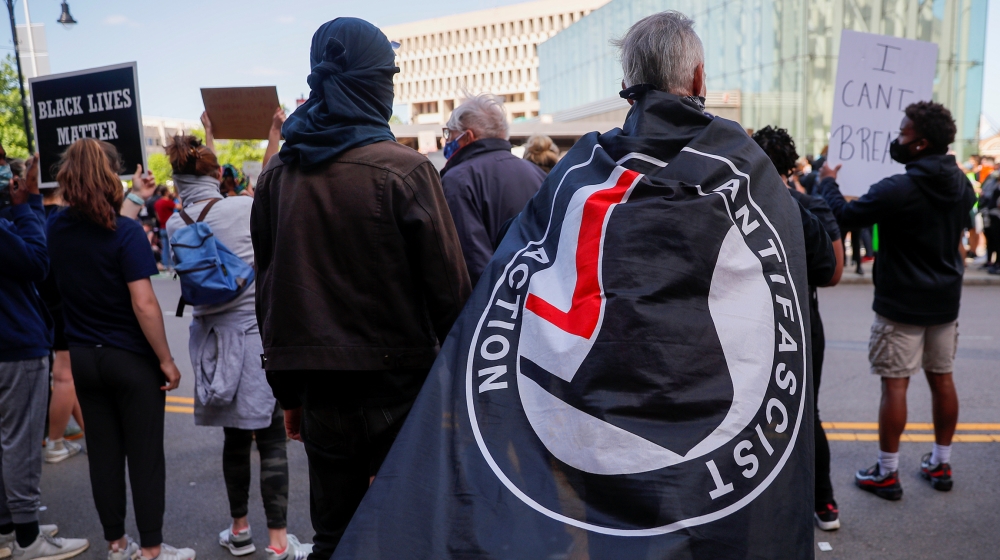Eager for an enemy to blame for the violent protests rocking the United States, President Donald Trump on Sunday signalled that he was preparing to label those associated with the Antifa movement as “domestic terrorists” and treat them accordingly, though legal experts say such a move would be unconstitutional and even if legal, would be hard to enforce.
Antifa, short for anti-fascists, is not a concrete group, rather an amorphous movement. Anti-fascists of the movement tend to be grouped on the leftward fringes of the US political spectrum, many describing themselves as socialists, anarchists, communists or anti-capitalists.
The issue Trump and his law enforcement cohorts face is how to corral adherents of a decentralised movement with no known leaders, no headquarters, and no clear ideology other than opposition to whatever its adherents see as right-wing, or fascist, movements.
In a statement released on Sunday, US Attorney General William Barr accused “violent radical elements” of hijacking the voices of “peaceful and legitimate protests” that have popped up across the US since an unarmed Black man, George Floyd, was killed by police officers in Minnesota last week.
Barr said these “outsiders” were pursuing their own agenda, adding that he was tasking officials with some 56 separate FBI Joint Terrorism Task Forces around the country with identifying, apprehending and charging the agitators.
“The violence instigated and carried out by Antifa and other similar groups in connection with the rioting is domestic terrorism and will be treated accordingly,” Barr said, without providing evidence for his claims.
Anti-fascist history
Beyond the dubious legality of Trump’s declaration – many experts said designating a domestic group as it does foreign terror organisations because of its ideology would be inherently unconstitutional – any effort to rein in Antifa advocates would face simple logistical hurdles such as where to begin.
Other than their opposition to right-wing ideologies, there is little binding the Antifa movement’s adherents together. Some focus on environmental causes or the rights of Indigenous groups, others for the rights of LGBT activists.
While an anti-fascist movement can be traced back to Germany and Italy before the second world war, the first US group to use the word “Antifa” in its branding was the Rose City Antifa (RCA) founded in 2007 in Portland, Oregon, though many groups have held anti-fascist ideology in the US for decades without using the branding.
RCA and other groups like it made it their goal to disrupt – violently if necessary – meetings and organisational efforts of white supremacists and their ilk.
One such effort, in 2012, saw Antifa adherents brandishing hammers, baseball bats and police batons storm a Chicago-area restaurant and assault members of the white supremacist Illinois European Heritage Association gathered there. Five of the attackers received prison sentences for their roles in the melee.
The election of Donald Trump in 2016 saw an increase in Antifa activity in the US, as followers became increasingly convinced that fascism and other right-wing ideologies were making new inroads in American politics. They gained particular prominence during clashes between white supremacists and their opponents in Charlottesville, Virginia, in August 2017, when a neo-Nazi rammed his car into a group of anti-racists, killing one protester.
Antifa made headlines again during public protests that same year in Portland, Oregon, and Berkeley, California, where they smashed windows and hurled Molotov cocktails at law enforcement officers to prevent right-wing provocateur Milo Yiannopoulos from speaking.
While anti-fascists get the most attention for their occasional violent behaviour, many adherents also advocate nonviolent means of getting their message across such as hanging posters, giving speeches and marching.
Institutional concern
FBI and other law enforcement officials have since 2016 voiced concerns about Antifa actors and the violence that sometimes accompanies their public appearances.
FBI Director Christopher Wray said in congressional testimony in November 2017 that the bureau had ongoing counterterrorism investigations into people accused of committing crimes in the name of Antifa.
The FBI, he said, was pursuing “a number of what we would call anarchist extremist investigations, where we have properly predicated subjects [people] who are motivated to commit violent criminal activity on kind of an Antifa ideology. So we have a number of active investigations in that space, all around the country.”
The language used by Wray in 2017 is similar to that used by Barr and others in the Trump orbit over the weekend in reference to the recent violence in US cities.
On Twitter, Trump, without providing evidence, blamed the violence on “Antifa and the Radical Left,” and his National Security adviser, Robert O’Brien, in a television appearance, called on the FBI to surveil and prosecute those part of the Antifa movement.
Law enforcement officials and those who monitor anti-fascists groups say they have in recent days seen indications – including anarchist graffiti and arrests of some out-of-state protesters – that people with disparate motives may be behind some of the violence in the anti-police brutality protests. They have also blamed white supremacist groups.
One Antifa activist group allegedly disseminated a message in a Telegram channel on Saturday that encouraged people to consider Minnesota National Guard troops “easy targets”, Defense Department officials told The Associated Press news agency. The message encouraged activists to steal “kit”, meaning the weapons and body armour used by the soldiers.
Furthermore, making the leap from prosecuting some anti-fascists for allegedly inciting violence to declaring an unorganised movement a “domestic terror” threat is a long one, according to legal experts. Doing so would require coordination across multiple federal agencies, something Trump lacks the legal authority to do.
“Terrorism is an inherently political label, easily abused and misused,” said ACLU National Security Project Director Hina Shamsi.
Mary McCord, a former senior Justice Department official, said, “No current legal authority exists for designating domestic organisations as terrorist organisations.”
“Any attempt at such a designation would raise significant First Amendment concerns,” added McCord, who previously served in the Trump administration.
Credit: Source link

